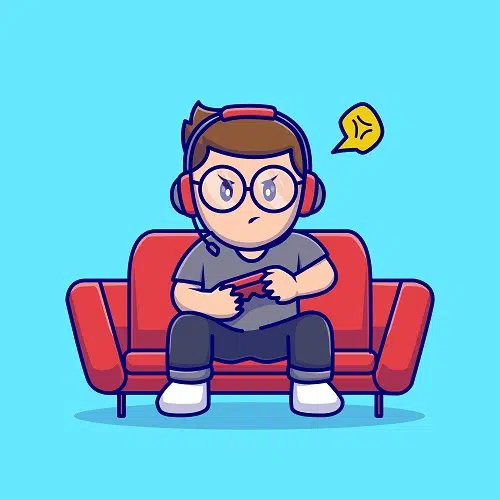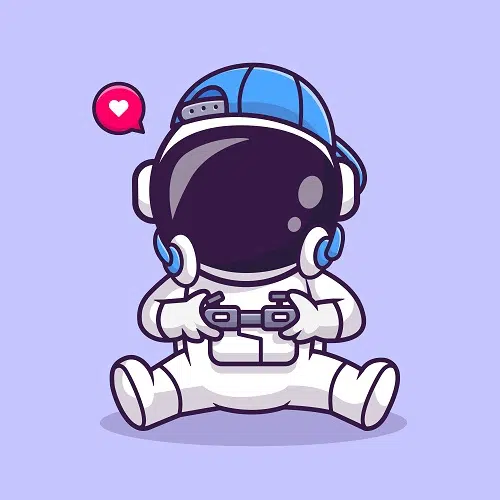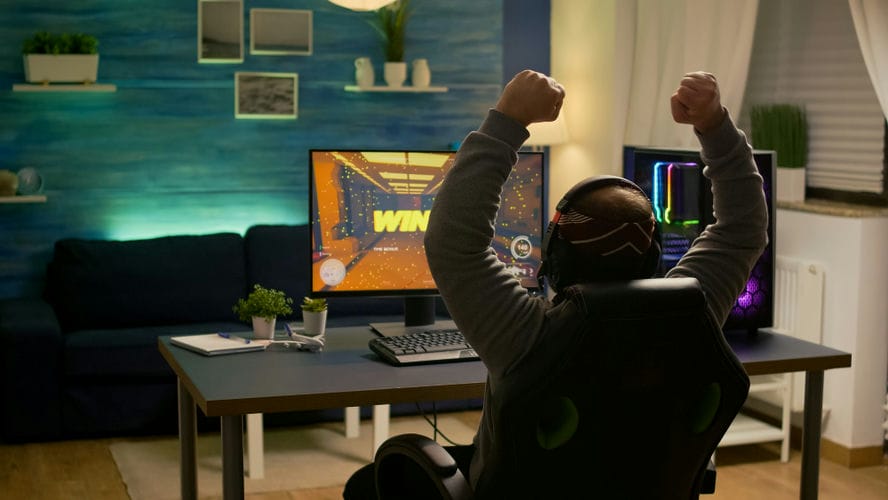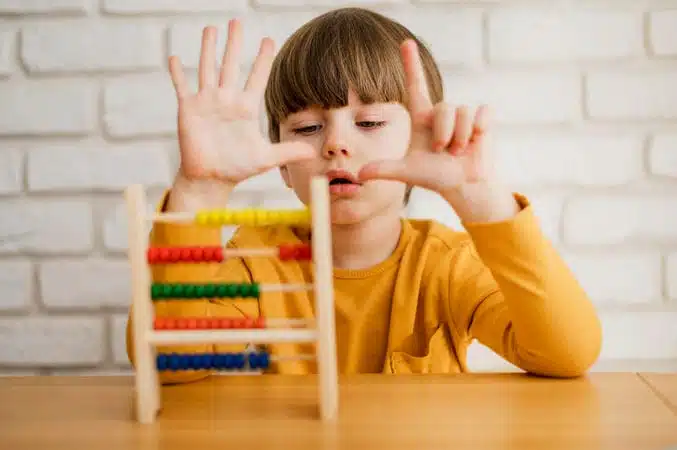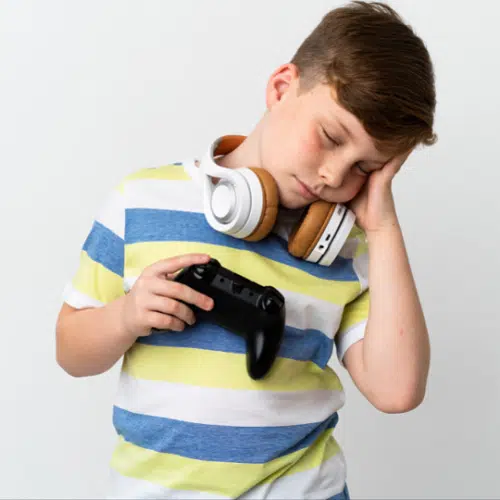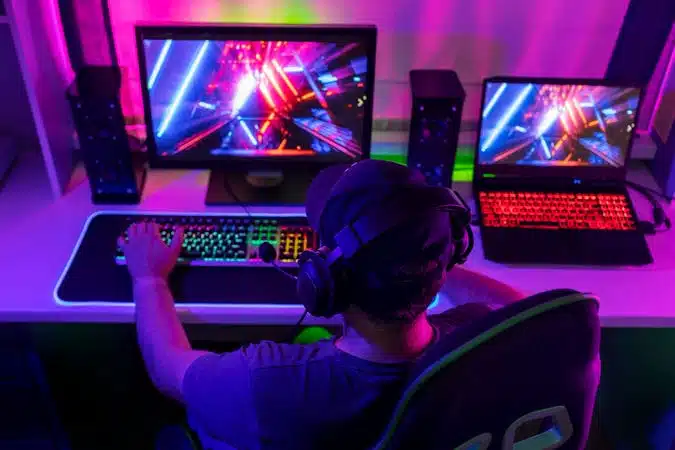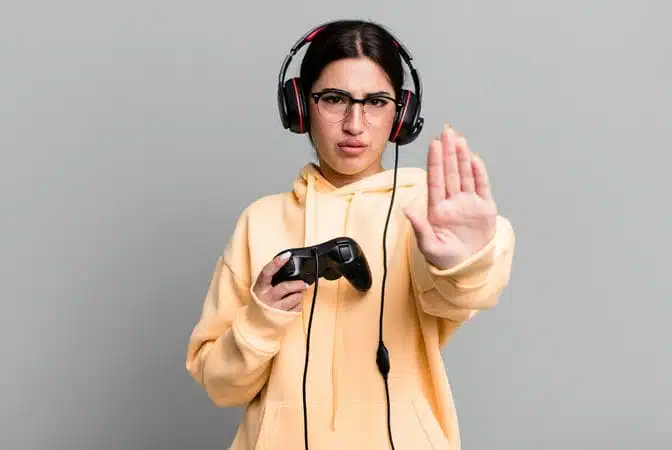If you have ever played video games, you have probably had people tell you that video games are a waste of time. While it is true that video games can have plenty of entertainment and even educational value, they can also have a number of negative effects on players. It is important to remember this whether you are an avid gamer or the parent of one.
Spending too much time gaming can have numerous effects on a person’s life, especially if they are young. A person’s time spent playing video games should be limited in order to make sure they remain healthy physically and mentally throughout the most important developmental periods in their life. Read on to learn what can happen and how to protect yourself or your loved ones.
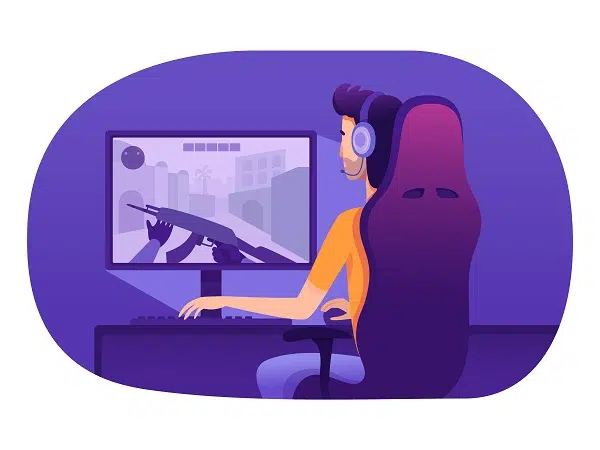
Why Is It Bad to Play Video Games All Day?
Various problems can arise if a young person has unrestricted access to video games. These issues can range from severe physical and mental health problems to issues surrounding their academic performance. There are plenty of reasons people, especially young children, should not spend too much of their time playing video games.
Playing video games all day long can result in many issues for children and adolescents. Parents are responsible for limiting the number of video games their children consume on a daily basis. Parents can succeed at setting limits on their children’s video game consumption in a number of ways.
- Make sure kids complete other tasks before playing games
- Ensure that your child understand the limits
- Put limits on your child gradually if they are unfamiliar with them
- Have appropriate consequences for breaking limit rules
- Set parental controls on your children’s games
- Remove gaming devices from your children’s bedrooms
Nowadays, video games are not confined to video game consoles like they used to be. Smartphones, tablets, and computers all offer the option to play video games. This means it is almost impossible to tell whether your child is doing their homework or playing video games when they are on their computer.
Fortunately, there are now some great tools available that make it much easier to monitor what your child is doing while playing games on their computer. With these tools, you can limit your child’s video game usage and ensure the rules you have put in place are being followed at all times.
Limit Launcher
When a kid is on his or her computer, Limit Launcher is the only automated parental control tool for limiting video game usage (among many other innovative functions). It’s a simple-to-use software that may be used to prevent children from accessing and playing video games when they’re not supposed.
One of the things that makes Limit Launcher great is it keeps kids from playing video games but does not prevent them from doing other things on the computer. This means it will not stop a child from using the internet though it will identify and stop certain video game programs from running. Keeping them from wasting the whole day gaming.
To celebrate our launch, we are offering an exclusive deal in which early supporters will receive a 3-year subscription for the price of one. There is also a 2-week free trial for all users – completely free of charge. Click here to register and get started with your free trial now. No credit card required.
Video Games Can Cause an Increased Chance of Childhood Obesity
Childhood obesity is a growing problem. In the United States, approximately 18.5 percent of children and adolescents from the ages of two to 19 years old suffer from obesity. The prevalence of childhood obesity is shown below, breaking these statistics down further.
- There is an approximately 13.9% obesity rate among 2-5-year-olds
- There is an approximately 18.4% obesity rate among 6-11-year-olds
- There is an approximately 20.6% obesity rate among 12-19-year-olds
This shows how quickly rates of obesity grow in populations of young people. It is clear that the rates only worsen as kids grow older, meaning that bad habits begin at a young age and are hard to break. There are many things that contribute to this, including diets lacking in nutritional value. However, too little activity is the other leading factor.
It is crucial to note, that a lack of exercise will contribute to obesity at any age. Getting a good amount of exercise is especially vital in a child’s formative years. This is imperative to remember because video games can lead children and teens to spend more time in their rooms sitting in front of a console or on their computer.
Though video games themselves are not evil, they can lead children and teens to spend less time outside getting the exercise they need. Limiting the amount of time your kids spend playing video games throughout the day forces them to take part in other activities. Some of which will hopefully get them moving and prevent weight gain.
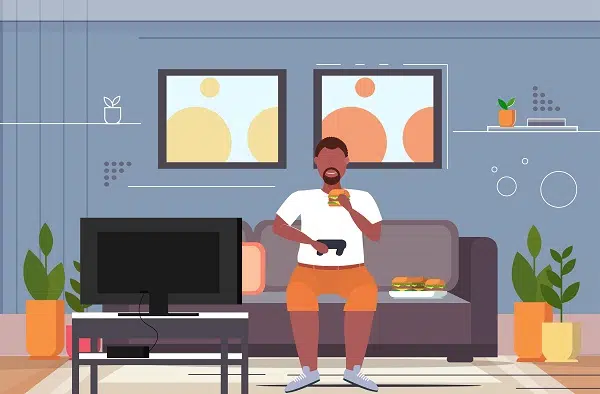
The Risks of Obesity
Childhood obesity comes with its own share of risks, more serious than just weight gain. If obesity in childhood is not reversed or delayed, it can lead to many health problems that will plague your child for their entire lives, such as:
- Diabetes
- High blood pressure
- Heart disease
- Stroke
- Cancer
Your child will likely not suffer from a stroke or heart disease. However, if your child develops childhood obesity and does not change their habits and get healthy, all of these diseases could potentially find them as they grow up.
While video games cannot be held directly responsible for the above diseases. The sedentary lifestyle one has when playing video games all day long is absolutely related to the health problems that arise.
Video Games Can Cause Other Physical Problems
Childhood obesity is, of course, a concern for any parent. However, numerous other physical issues can arise from sitting in front of a screen all day playing video games. Leading a sedentary lifestyle can cause weight gain but sitting for too long also has other negative effects.
Maintaining a seated position for hours on end can cause even young people to have problems with their hips and backs. Though your child may be young, sitting for extended periods of time, especially with poor posture, leads to compression of the joints and can cause many issues that will plague them for a lifetime if not corrected.
Another common issue is computer vision syndrome. This issue arises when a person’s eyes become fatigued after staring at a computer screen for too long. There are some solutions, such as glasses designed to alleviate this fatigue, but these are not perfect. The best overall solution is to limit screen time. Click here to learn more about how screen time is affecting your life.
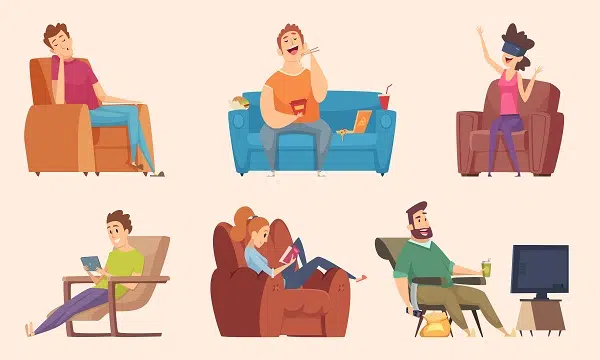
More Severe Physical Problems Related to Constant Video Game Playing
Some of the physical problems that arise from wasting too much time playing video games include:
- Osteoporosis
- Muscle atrophy
- Lowered immunity
- Vision problems
Luckily, young children can overcome a lot of the physical issues that might arise in an older player. However, if the bad habits are not put in check at a young age, they will only worsen as time goes on. It is so important to limit time spent playing video games so that your child can benefit from the many other, healthier alternatives available.
Video Games Can Lead to Reduced Academic Performance
Though children and young teens do not have jobs to worry about, they do have schoolwork to keep up with. This is just as important because it will most likely affect the course of their lives. They cannot play video games at school, but spending too much time playing video games can affect their academic performance in numerous ways.
Researchers say it is best for most children and teens to spend approximately 10 minutes per day studying per grade level. This means a third grader should spend about a half-hour studying while a high school senior should ideally spend about two hours studying each day.
This time may vary depending on many factors. For example, on certain days, a student may come home with a little more homework than normally. Some schools may also be more hands-on, meaning students do not need to study at home as much. Another consideration is that some students may need to study more than others to reach the same results.
Regardless, spending too much time playing video games keeps children of any age from taking care of other important tasks and responsibilities. This can impact their performance and keep them from making progress. Falling behind in school can set them up for failure. Setting limits so you know they have time to get homework and studying done is important.

Problems with School or Work
Excessive video game playing can cause productivity issues for both children and adults. As stated above, children and teens might begin slacking on their studies and letting their grades slip if they cannot pull their focus away from gaming. It can even lead to numerous absences due to missed alarms, oversleeping, and lack of motivation.
Teenagers with jobs and adults can experience these same issues. People who stay up all night playing video games are less likely to wake up when their alarm goes off in the morning. If this happens enough times, they may be fired from their job. Without a means of income, rent and bills will pile up, which can cause a person to spiral.
It might seem like a stretch to jump from video games to losing one’s job. However, this happens all the time to people who are unable to pull themselves away from their games. This is why it is better to get a hold of these habits and squash them early on by limiting your child’s gameplay in their early, formative years.
Video Games Can Lead to Reduced Time for Sleep
How much time per day should a child or teenager be sleeping? And how much time per day is your child sleeping if they are staying up late to finish the latest levels in the video game they are addicted to? These are important things to note because studies show:
- Children from the ages of three to six need approximately 10 to 12 hours of sleep per night.
- Children seven to 12 years old need approximately 10 to 11 hours of sleep per night.
- Adolescents need approximately eight or nine hours of sleep per night.
It is already hard enough for children, adolescents especially, to get enough sleep when they have to worry about studying for big tests, their social lives, and any extracurriculars they might have. If they are adding multiple hours of video games to the mix, that is a recipe for trouble.
Not getting enough sleep can lead to many serious issues. Not only is it bad for your health, raising your risk for conditions such as obesity and serious heart problems. It can also lead to mood problems such as depression and anxiety.
This is why it is critical to ensure your children and teens are getting enough sleep. It is true that children have more energy and fewer responsibilities, but that does not change what they need from a biological standpoint. If you believe video games are cutting into your child’s sleep time, setting hard limits on how much they play should be a priority.
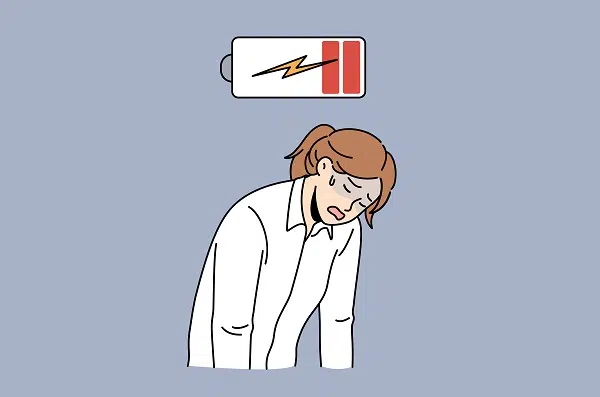
Video Games Can Cause Problems with Mental Health
Young children are sponges who soak up so much from the environment around them. It is important that they have stable influences to ensure they learn healthy and favorable coping mechanisms.
A person’s mental health is just as important as their physical health and should be treated as such. Mental health problems can be exacerbated by video games.
Video games can harm a child’s mental health both by the content in the video game and by the excessive time spent playing the video game. A child’s mental health is so significant because the formative years during childhood and adolescence shape a person’s outcome and what kind of person they will grow to be.
Video Games and Depression
Playing excessive video games can lead to depression in people of all ages. Children are no different. Playing video games releases chemicals in the brain that gives kids a feel-good sense of reward. If a child spends a lot of time with these rewarding chemicals firing, the time spent away from video games will feel downright lackluster and empty.
It is dangerous for a person to feel unfulfilled and unrewarded simply by living their normal life. This feeling of emptiness can compound into severe depression, even for young children. This is one reason why limiting their screen time is so important.

Video Games and Anxiety
Where depression comes, so often does anxiety. Intense video games can exacerbate feelings of anxiety in the following ways, in both children and adults:
- Feelings of anxiety around other people
- Strong desire to be alone
- Constantly feeling alert and on edge
If a person plays video games that are high energy, their eyes are always darting around the screen looking for the next target or enemy. Their blood pressure is always increased, and their fight-or-flight instinct is kicked up a notch. The brain cannot turn this off like a switch, so these feelings linger even when the video game is off.
These anxious feelings can make it difficult to want to socialize or be around others because it can feel overstimulating and exhausting. Unfortunately, staying at home might lead to more time spent playing video games—a vicious cycle.
Video Games and Addiction
Addiction is a mental illness just like any other. In the last few years, video game addiction specifically has been recognized as a legitimate mental illness. While you do not think of children or adolescents as addicts, video game addiction can begin at a young age if the habits that lead to it are not broken.
Of course, not every person who plays video games, child or adult, will become addicted. Video games are not that nefarious. However, if a person becomes dependent upon video games and spends all of their time in a video game world. The consequences can be disastrous on the other facets of their life.
Video Games Can Lead to Reduced Hygiene and Cleanliness
Children at the age of pre-adolescence already struggle with hygiene. This is a time in their life when they have to start bathing more and using deodorant, things that they are not used to doing. Every child goes through this. However, if a child is obsessed with video games, adding a hygiene routine to their life becomes even more difficult.
Video game addiction leads to detachment from the real world, so your child may stop caring about what they look like or how they smell to others. This can be unfortunate for you and anyone else in the household. It can also cause problems for your child at school, especially at an age when other kids are cruel.
Be sure to keep an eye on how much time your child or adolescent is spending playing video games. So that you can ensure they are keeping track of their necessary hygiene routine. A bit of laziness is to be expected from any child or teen, but your child cannot let the following healthcare and hygiene matters fall to the wayside in favor of playing.
- Bathing
- Dental care
- Laundry
- Tidying up their space

Video Games Can Lead to Less Time Spent Socializing With Peers
When kids and teens get online to play games, they get a few chances to socialize in the form of text and voice messages. However, these messages are much different than the social interactions they share with their peers. Sometimes, people who play video games excessively can get lost in online socializing and stop socializing in real life.
The importance of socialization for children and teens cannot be overstated. This is especially true in a world where our younger generations and doing an increasing amount of their socializing online through social media or via text and phone. The human species is social in nature and requires face-to-face human interaction.
Seeing friends and relatives in person is still important for kids and teens. Having relationships with others their age gives children practice handling their emotions. This is a vital skill to learn, especially as children grow older. Social skills are called that because they are learned through socializing with others.
Children and teens may not feel it is as important to go out and spend time with friends or relatives if they are able to do this in a video game setting. Limiting the time they spend on their video games forces them to head out and have these social interactions with others. It can also help prevent them from losing important friendships.
Video Games Can Lead to Less Time Spent Reading
Video games can be a great way to get many kids started with reading. This is because many games contain text that forces kids to read so they can progress through the game. The benefits stop, though, when the educational worth of the video games are outweighed by the negative effects video games start having on the player.
Most games still do not contain large amounts of text. This means kids will not be spending a lot of time reading as they play video games. If their time playing games is not limited, they will not spend much time outside the classroom practicing their literacy skills. This is especially true when the video games they play are not educational.
This is important because even young people who do not enjoy reading full novels can practice by reading comic books and other similar materials. Limiting video game usage keeps children away from the screen and gives them more time to focus on other important life skills.
A child who starts reading at a young age will be more likely to read for fun as they grow up. Reading books is what allows a person’s vocabulary to grow and blossom. Children who read a lot growing up are more likely to score better in reading comprehension and vocabulary tests. They will also be better writers and communicators.

Video Games Can Lead to Less Interest in Other Hobbies
What are your child’s interests besides video games? Many kids who are obsessed with video games from a young age do not have many other hobbies or interests. This has become a major problem for young people today. Before video games were hugely available, children had to have other hobbies to keep themselves entertained.
Those children and teens who spend too much of their time playing video games simply do not have the energy or the focus for other hobbies. However, limiting their time spent playing video games can force them to stop and think about other things they may be interested in. Some examples include:
- Art and photography
- Dance and fitness
- Singing and music
- Writing and literature
- Board games and puzzles
One of the great benefits of getting into other hobbies is children get to socialize and meet new people in the process. They may meet other children with the same interests with whom to socialize. They can also learn a variety of new skills. These skills can even help them in the future, especially if they are able to be applied to future careers.
Video Games Can Lead to Unrealistic Views of the World
A child or adolescent who wastes all their time playing video games will not experience important life lessons that occur in the real world. To add to this fact, video games include several inaccurate depictions of people and the world. Your child or teen might mistake these false depictions as reality and develop damaging perceptions.
Even today, most video games feature majority white male protagonists, so children of color who may be playing these video games are not seeing themselves represented. It is the same problem seen across all types of media. You want to foster encouragement and self-love in your child, so be sure your child is consuming positive materials.
Video games are notorious for designing female characters with unrealistic body proportions for the purpose of being sexualized. They also include racial stereotypes that are problematic and do not reflect life in the real world. Children and teens need to see the world through their own eyes and form ideas based on their own experiences.
Video Games Can Desensitize Players to Extreme Violence
The argument that video games cause violent tendencies has been made since video games moved past Pong and into the first-person realm. Critics of video games have gone around and around, stating that intense violence in video games causes players to become more likely to commit violent acts themselves.
While this particular claim is dubious, the fact that some games contain extreme violence is undeniable. Video games like DOOM Eternal and Mortal Kombat 11 are so full of blood, gore, and guts that most people cannot even stomach the idea of watching someone else play them. Still, players enjoy these games for the shock factor. These games might be desensitizing players to this kind of extreme violence, which is not necessarily a good thing. It is not natural for humans to see such horrific scenes on a daily basis, even if they are animated or clearly fake. It is uncertain how this kind of desensitization can affect a person or even society in the long term.








